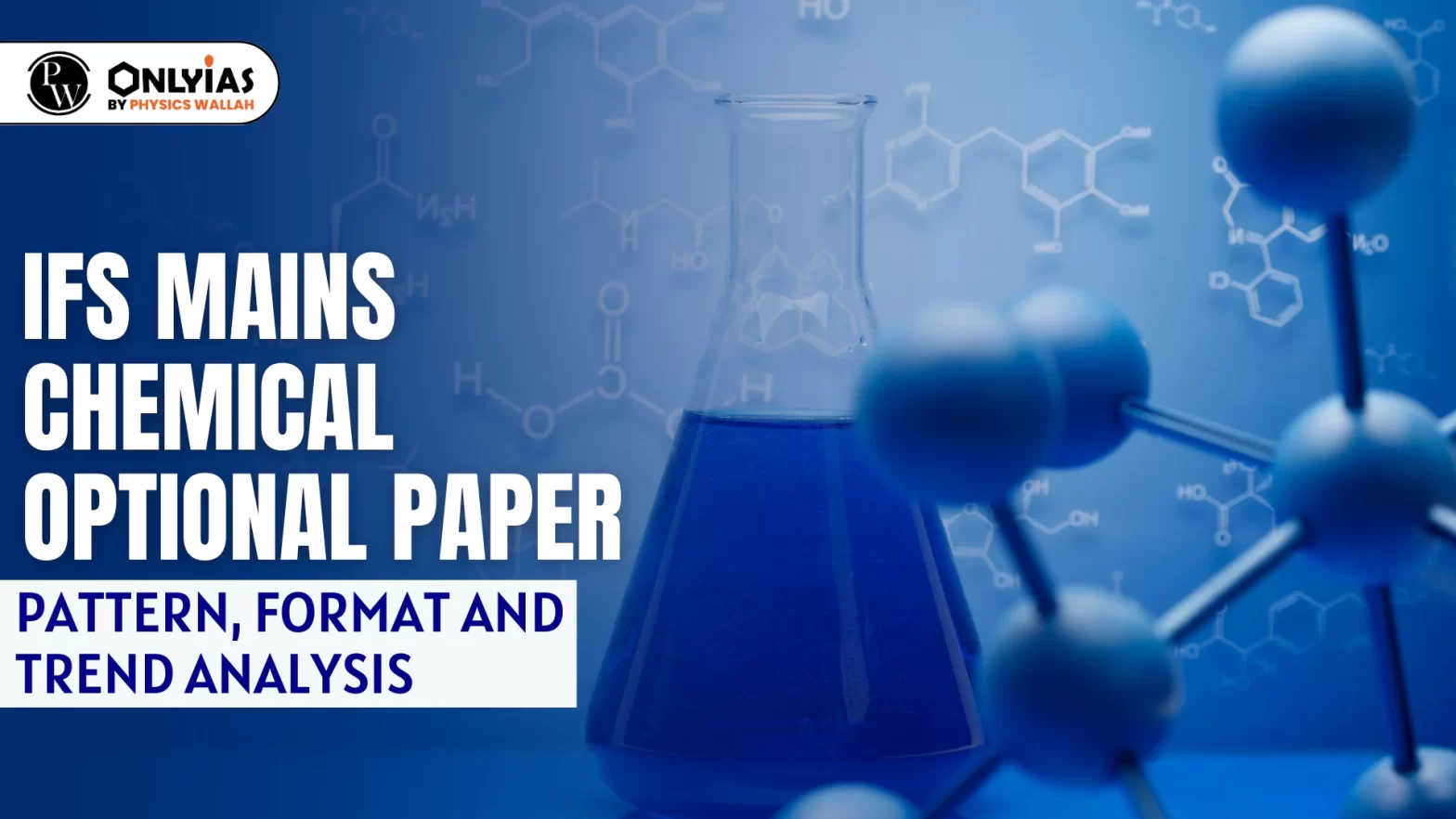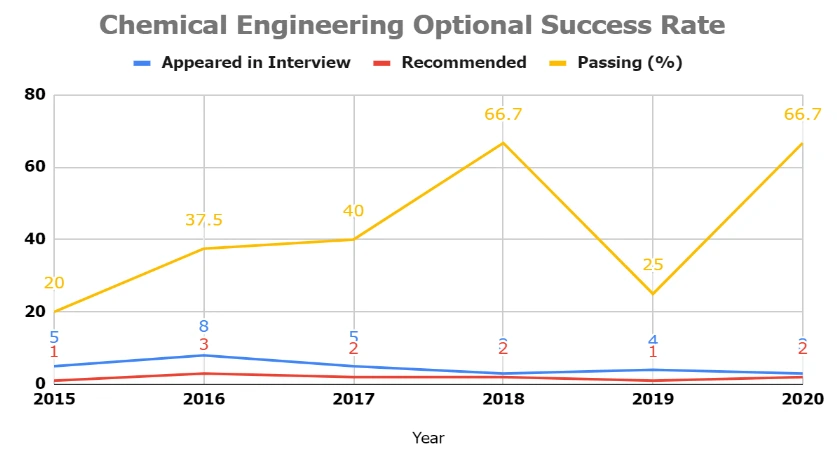UPSC IFS Mains Chemical Optional Question Paper Insights & Paper Analysis is available here. Download 2018-2022 Chemical Optional question papers to boost your prep.

UPSC IFS Mains Chemical Optional Paper: The UPSC IFS mains consist of a total of six papers with a total of 1400 marks. The IFS Mains examination includes two papers: one on English and one on General Knowledge. The remaining four papers (Paper I, Paper II, Paper III, and Paper IV) cover optional subjects. Among the optional subjects, Chemical Engineering is a popular choice for candidates with a background in this field. This optional paper is divided into two papers—Paper I and Paper II—each carrying 200 marks, totaling 400 marks for the Chemical Engineering optional.
In the UPSC IFoS Mains exam, Chemical Optional Paper consists of two types, specifically Paper I and Paper II. Each of these papers carries a weightage of 200 marks, summing up to a total of 400 marks for this optional subject. Among the various optional subjects offered by UPSC in IFoS, Chemical Engineering is one of the 14 optional subjects available to candidates.
|
Chemical Engineering |
Syllabus |
| Paper I | Fluid and Particle Dynamics Viscosity of fluids. Laminar and turbulent flows. Equation of continuity and NavierStokes equition-Bernoulli’s theorem. Flow meters. Fluid drag and pressure drop due to friction, Reynold’s Number and friction factor – effect of pipe roughness. Economic pipe diameter. Pumps, water, air/steam jet ejectors, compressors, blowers and fans. Agitation and mixing of liquids. Mixing of solids and pastes. Crushing and Grinding – principles and equipment. Rittinger’s and Bond’s laws. Filtration and filtration equipment. Fluid-particle mechanics – free and hindered settling. Fluidisation and minimum fluidization velocity, concepts of compressible and incompressible flow. Transport of Solids.
Mass Transfer, Molecular diffusion coefficients, First and second law and diffusion, mass transfer coefficients, film and penetration theories of mass transfer. Distillation, simple distillation, relative volatility, fractional distillation, plate and packed columns for distillation. Calculation of theoretical number of plates. Liquid-liquid equilibria. Extraction – theory and practice; Design of gas-absorption columns. Drying. Humidification, dehumidification. Crystallisation. Design of equipment. Heat Transfer Conduction, thermal conductivity, extended surface heat transfer. Convection – free and forced. Heat transfer coefficients – Nusselt Number. LMTD and effectiveness. NTU methods for the design of Double Pipe and Shell & Tube Heat Exchangers. Analogy between heat and momentum transfer. Boiling and condensation heat transfer. Single and multiple-effect evaporators. Rediation – StefanBoltzman Law, emissivity and absorptivity. Calculation of heat load of a furnace. Solar heaters. Noval Separation Processes Equilibrium separation processes – ion-exchange, osmosis, electro-dialysis, reverse osmosis, ultra-filtration and other membrane processes. Molecular distillation. super critical fluid extraction. (e) Process Equipment Design Factors affecting vessel design criteria – Cost considerations. Design of storage vessels-vertical, horizontal spherical, underground tanks for atmospheric and higher pressure. Design of closures flat and elliptical head. Design of supports. Materials of construction-characteristics and selection. Process Dynamics and Control Measuring instruments for process variables like level, pressure, flow, temperature pH and concentration with indication in visual/pneumatic/analog/digital signal forms. Control variable, manipulative variable and load variables. Linear control theoryLaplace, transforms. PID controllers. Block diagram representation transient and frequency response, stability of closed loop system. Advanced control strategies. Computer based process control. |
| Paper II | Material and Energy Balances Material and energy balance calculations in processes with recycle/bypass/purge. Combustion of solid/ liquid/gaseous fuels, stoichiometric relationships and excess air requirements. Adiabatic flame temperature.
Chemical Engineering Thermodynamics Laws of thermodynamics. PVT relationships for pure components and mixtures. Energy functions and inter-relationships – Maxwell’s relations. Fugacity, activity and chemical potential. Vapour-liquid equilibria, for ideal/non-ideal, single and multicomponent systems. criteria for chemical reaction equilibrium, equilibrium constant and equilibrium conversions. Thermodynamic cycles – refrigeration and power. Chemical Reaction Engineering : Batch reactors – kinetics of homogeneous reactions and interpretation of kinetic data. Ideal flow reactors – CSTR, plug flow reactors and their performance equations. Temperature effects and run-away reactions. Heterogeneous reactions – catalytic and non-catalytic and gas-solid and gas-liquid reactions. Intrinsic kinetics and global rate concept. Importance of inter-phase and intra-particle mass transfer on performance. Effectiveness factor. Isothermal and non-isothermal reactors and reactor stability. Chemical Technology Natural organic products – Wood and wood-based chemicals, pulp and paper, Agro industries – sugar, Edible oils extraction (including tree based seeds), Soaps and detergents. Essential oils – Biomass gasification (including biogas). Coal and coal chemical. Petroleum and Natural gas-Petroleum refining (Atomospheric distillation/cracking/reforming) – Petrochemical industries – Polyethylenes 31 (LDPE/HDPE/LLDPE), Polyvinyl Chloride, Polystyrene. Ammonia manufacture. Cement and lime industries. Paints and varnishes. Glass and ceremics. Fermentation – alcohol and antibiotics. Environmental Engineering and Safety Ecology and Environment. Sources of pollutants in air and water. Green house effect, ozone layer depletion, acid rain. Micrometeorology and dispersion of pollutants in environment. Measurement techniques of pollutant levels and their control strategies. Solid wastes, their hazards and their disposal techniques. Design and performance analysis of pollution control equipment. Fire and explosion hazards rating – HAZOP and HAZAN. Emergency planning, disaster management. Environmental legislations – water, air environment protection Acts. Forest (Conservation) Act. Process Engineering Economics : Fixed and working capital requirement for a process industry and estimation methods. Cost estimation and comparison of alternatives. Net present value by discounted cash flow. Pay back analysis. IRR, Depreciation, taxes and insurance. Break-even point analysis. Project scheduling – PERT and CPM. Profit and loss account, balance sheet and financial statement. Plant location and plant layout including piping. |
UPSC Chemical Optional Paper from 2018 to 2022 are readily available for aspirants seeking to enhance their preparation. We provided access to the UPSC IFS Chemical Optional Paper in PDF format, an invaluable resource for your preparation.
| Year | Paper |
| UPSC IFoS Chemical Engineering Question Paper 2018 | Download Paper I |
| UPSC IFoS Chemical Engineering Question Paper 2019 | Download Paper I |
| UPSC IFoS Chemical Engineering Question Paper 2020 | Download Paper I |
| UPSC IFoS Chemical Engineering Question Paper 2021 | Download Paper I |
| UPSC IFoS Chemical Engineering Question Paper 2022 | Download Paper I |
Candidates appearing for the UPSC (Union Public Service Commission) IFS examination must make a thoughtful choice when selecting their optional subject, as it holds substantial weightage in the evaluation process. With a total of 800 marks allotted, the optional subject constitutes approximately 48% of the combined marks for both the written exam and the personality test.
The table below offers a comprehensive overview of the success rate achieved by candidates who opted for Chemical Engineering as their option.
| Year |
Number of Candidates |
||
| Appeared in Interview | Recommended | Passing (%) | |
| 2015 | 5 | 1 | 20 |
| 2016 | 8 | 3 | 37.5 |
| 2017 | 5 | 2 | 40 |
| 2018 | 3 | 2 | 66.7 |
| 2019 | 4 | 1 | 25 |
| 2020 | 3 | 2 | 66.7 |

By examining the past Chemical Optional Paper, we can identify a trend in the types of questions asked. There is also a noticeable shift in the themes of the questions. Understanding the UPSC IFS Chemical Optional Paper Trend Analysis is advantageous, as it allows candidates to streamline their preparation effectively and enhance their performance in this optional subject.
Please note that before selecting Chemical Engineering as your optional subject, carefully weigh these disadvantages against the advantages and consider your own background, interests, and the time you can dedicate to preparation.
| Must Read | |
| NCERT Notes For UPSC | UPSC Daily Current Affairs |
| UPSC Blogs | UPSC Daily Editorials |
| Daily Current Affairs Quiz | Daily Main Answer Writing |
| UPSC Mains Previous Year Papers | UPSC Test Series 2024 |
No, according to official notification two engineering subjects can not be combined for mains exam.
No, it is not permissible
Scoring in any subject depends on many factors like availability of resources, guidance, prior knowledge and right strategy. If candidates have all these options accessible then yes any subject is scoring.

<div class="new-fform">
</div>